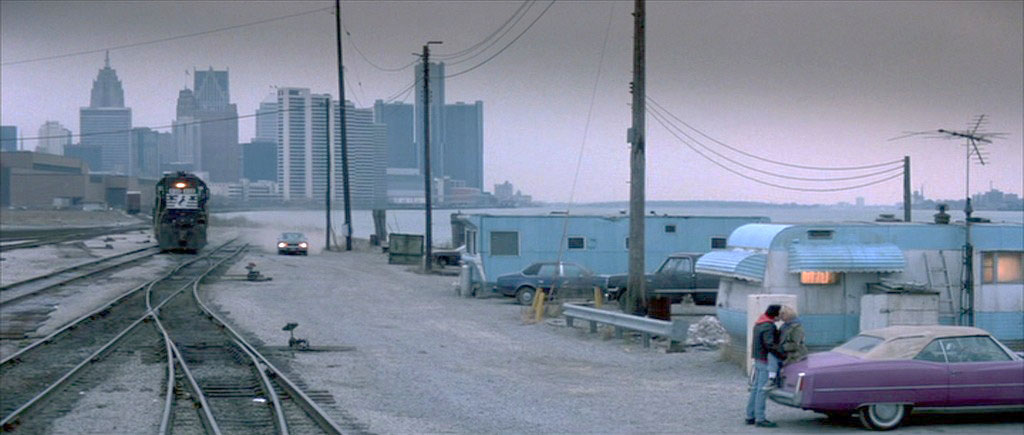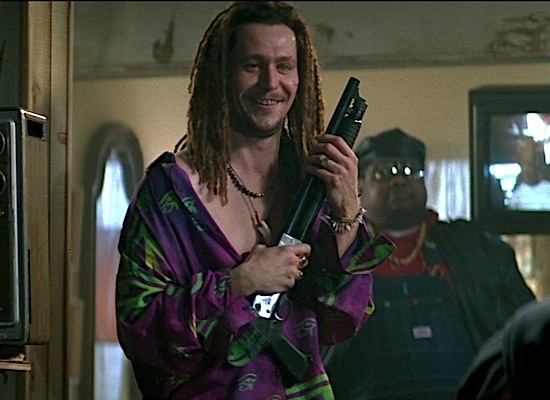
Walter Lucken IV
December 22, 2023
1. The irony is that writing about Detroit from Brooklyn would be a cardinal sin to the Luckens. I can’t imagine something that would induce more mockery during a holiday dinner, perhaps reaching for this example because a holiday dinner will be my next occasion to visit. As I sit down to make sense of True Romance and how it works its way through how I understand myself in relation to the city I’m transported in time to my uncle’s white van on I-94 in the pitch blackness of the early evening, working our way back to “Midtown”/”Cass Corridor” from an off the books scrap job in the suburbs. My uncle explains “True Romance, dude that was just my life in my 30s in Detroit, I spent the whole decade waiting for Patricia Arquette to show up! Shit I don’t know how she looks now but I wouldn’t kick her out nonetheless heh heh”. For whatever reason his mood allowed me a cigarette with the window cracked that evening, my “cousin” who would later pass from an early adopter fentanyl overdose couldn’t be bothered to complain as he slept silently in the back of the van.
True Romance in my family occupies a space across two vague and increasingly porous borders: that which separates the true from the false and that which separates that which is to be spoken of and that which is not.
Of course, the former is easier to explain than the latter. What’s true? Which family members really did go to jail and what for and for how long, which family members used to do heroin, which family members have been sexually assaulted and by who, what grandpa really died from, who does or doesn’t have HIV, who does or doesn’t have heart disease, whether it runs in the family, who is really whose cousin, grandpa, whoever. Whether I’m really from Detroit, whether my dad is, who really got who the job where. The answer’s different at different times.
I already breached the latter by entertaining the possibility that anybody in my family had been anywhere near jail, heroin, HIV, heart disease, sexual assault, and so on. I’ve been accused of lying about being a former welfare recipient, an accusation which comes more readily now that I live in Brooklyn in a big apartment during a globally unprecedented housing shortage in New York City. Hilariously, I was in fact instructed to lie about being a welfare recipient alongside a great many other things while I was one. My mother’s ever-present fear of losing custody of my brother and I (and what we might experience in foster care) lay at the root of a great many lies I was expected to tell. This created a dynamic where I aggressively told and even exaggerated the truth in retaliation, leading to vague accusations in adulthood that I was hiding secret intergenerational wealth and faking my crooked teeth.

2. The obvious point about True Romance is that it is a movie set largely in Detroit, a city overwhelmingly Black by the early 90s period it depicts, which stars white actors and only features Black characters in small roles. Every speaking Black character in the movie is eventually shot to death by a white man, either the obviously (and villainously) Black influenced Drexl or the movie’s protagonist Clarence Worley.
The two shootings, in which Drexl executes two presumed drug dealers in a surprise robbery and then is himself shot to death by Clarence alongside his associate Butch. Prior to Clarence shooting him in the face several times after shooting him in the groin, Drexl beats Clarence viciously and remarks to Butch that Clarence “must have thought it was white boy day”, to which Butch replies that it is not, in fact, “white boy day”. Anecdotally, I can attest that most of my acquaintances have interpreted this scene as Clarence metaphorically asserted a hegemonic white masculinity and symbolically killing the pimp and drug dealer Drexl as a rejection of his corruption and its source in what Tony Scott depicts as Detroit’s Black underclass culture. Thus, Drexl is a villain in the post-white flight landscape of post-industrial Detroit because he has adapted to its culture and symbolically claimed a pathological Blackness for his own, a Blackness which Butch tacitly recognizes by answering in the negative that it isn’t “white boy day”.
This surface level reading, to me, is mistaken. For reasons alluded to in the second half of this essay, I can’t fully explain why, but I can almost get there. The attentive viewer will notice that the figment of Clarence’s imagination who appears to him in visions and guides him in his various quests is a fictionalized version of Elvis Presley. Elvis, in this sense, counterposed to Drexl, is an ironic model of white masculinity given that Elvis himself is widely recognized to have copied the mannerisms, visual style, and musical acumen of the Black performers of his era.

When compared to Drexl, portrayed by Gary Oldman who based the characters accent and mannerisms on the rapper Ice-T, Elvis and Clarence as his avatar are no more “real” as white men than Drexl is. What this shows us is that the image of white men in cinema is in many ways always a copy, as whiteness itself is a cultural dead end and cannot create at all, only destroy. At bottom, then, without disputing its faults or denying that its treatment of its Black characters is problematic (characteristic of Tarantino’s oeuvre), I argue that True Romance can be productively read not simply as a Detroit movie that erases Detroit but rather a meditation on how white men in post-white flight pre-redevelopment Detroit might imagine their own relationship to the city and themselves. In conclusion, I call the reader’s attention to the film’s climax where we find Clarence on the beach with his wife Alabama and a child, hinting that he too has completed his own white flight narrative via the formation of a nuclear family and successfully executed escape from the city.